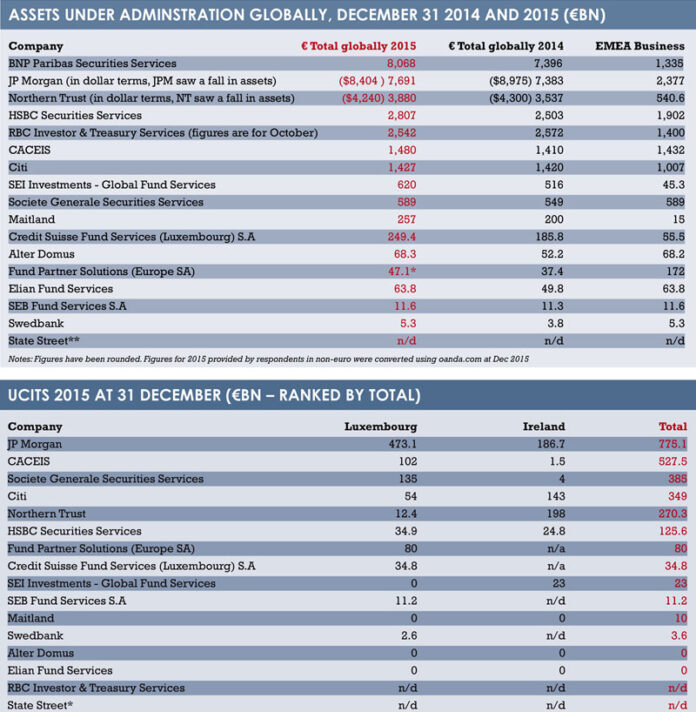Alternative funds are increasingly en vogue with institutional investors thanks to tighter regulation and greater oversight. Nicholas Pratt looks at how fund administrators are adjusting.
Convergence is everywhere in the investment industry. Smart beta strategies are bridging the gap between active and passive management, and ‘liquid alternative’ funds are offering the relative transparency of long-only funds with the exoticness of alternative funds – like a vanilla milkshake spiced up with a shot of Kahlúa.
The interest in liquid alternatives has not gone unnoticed by fund administrators. The demand is still far higher in the US, particularly in the retail market, where McKinsey has predicted they will account for 50% of net new retail revenues for the next five years. But there is a growing interest for regulated alternative funds among European institutional investors, too, according to executives in this year’s Fund Administration survey.
The low interest rate environment coupled with rising volatility in emerging markets has effectively led fund management firms to broaden the range of their investments.
“Liquid alternatives has been an area of continued activity, in both single and multi-manager form as institutional investors seek to diversify strategy,” says Marcel Guibout, head of fund services in Europe, Middle East and Africa (Emea) at JP Morgan.
Similarly, Daniel Siepmann, chief executive officer at Credit Suisse Fund Services (Lux), says: “Overall we noticed an increased diversity of products,” adding that the majority of its funds business has been alternative investment funds and a growing number of emerging market products.
Siepmann says there has also been a broader spectrum of management companies emerging – including pure third-party providers and in-house – to provide services regulated under the Alternative Investment Fund Managers Directive (AIFMD).
The broadening asset types and management companies and instances of convergence all give the impression that the market is currently in a state of transition, unsure of whether to target their businesses wholly at alternative funds or traditional funds, and so instead choosing to do both and to seek clients, such as liquid alternatives managers, that purport to offer the benefits of both.
But administrators also note that firms are worried about future volatility and certain geo-political risks such as a Britain leaving the European Union. Kavitha Ramachandran, Maitland’s senior business development and client manager, says: “We’ve seen an increased demand for new funds in all domiciles but managers are being cautious and launch times are being extended.”
For fund administrators, this creates a number of challenges. Firstly, they have to forecast what direction the market will take and amend their service offerings. Many have already sought to do this when it comes to demand for liquid alternatives, sophisticated Ucits or European regulated alternative investment funds.
In the US, administrators have set up Series Trusts to manage all the servicing needs for liquid alternatives, from the initial set-up of a fund, through to transfer agency and valuations. In Europe, administrators have established umbrella funds to act as platforms to support liquid alternative funds here – though it remains to be seen how popular these will be.
There are some obvious advantages, such as more operational efficiencies for fund firms, but they may also lose some elements of control if they join platforms. For example, would independently minded hedge fund managers be prepared to let platforms appoint their own board of directors?
COMPLICATIONS
There are technical and operational challenges for fund administrators looking at the liquid alternatives business – for example, they need to engineer existing illiquid fund structures so that there are liquidity windows in closed-ended funds. This challenge could become even more complicated if the liquid alternatives trend spreads to private equity or real estate assets.
“Institutional and retail money is increasingly shifting to real estate and private equity assets,” says Sébastien Danloy, head of continental Europe and offshore at RBC Investor & Treasury Services in Luxembourg. He expects continued regulatory change from the AIFMD, as well as the new European Long-term Investment Funds – or Eltifs – to increase transparency, comparability and quality in these asset classes, which in turn will increase the operational burden on fund managers and force them into the arms of administrators.
Regulation may be a double-edged sword for fund administrators who service these regulated and transparent alternative funds. Now more than ever, administrators should be seeking to service their clients on a single platform and marry the complexity of derivative processing and performance fees with the scale and daily liquidity associated with mutual funds. But this is no easy task.
And while in the past, most fund management clients may not have cared too much about exactly how their products were processed and administered as long as nothing went wrong and the fees were acceptable, that is changing.
Regulation like the AIFMD is insisting that managers are able to assess the effectiveness of their service providers, and this includes their fund administrators.
©2016 funds europe





